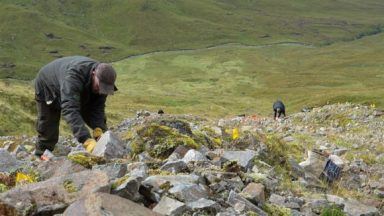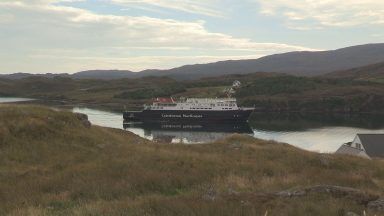Actress Joanna Lumley is calling for Second World War bombs found in British waters to be burned out rather than detonated for the sake of whales and dolphins.
The film star and activist has teamed up with marine conservation charities to call for a change in how unexploded war munitions found during the construction of wind farms are disposed of.
In 2011, at the Kyle of Durness in Sutherland, 39 long-finned pilot whales entered the bay at high tide and became stranded, with 19 eventually dying.
A Government report found that nearby bomb disposal operations in the days leading up to the tragedy were “the only external event with the potential to cause” the whale strandings.
There are believed to be about 100,000 tonnes of explosives left in Britain’s seas, with some of the wartime relics weighing up to half a tonne.
Many of these munitions need to be cleared for safe construction of wind farms.
Ms Lumley said the continued “blow it up” approach is “completely nuts” and called for devices to burned out instead, using a technique called low order deflagration.
The Government said it recognises the impact detonations can have on vulnerable marine species and is working to reduce underwater noise but “must ensure any clearance method used is both safe and effective”.
Ms Lumley has worked with Marine Connection, the World Cetacean Alliance and Advocating Wild to launch the Stop Sea Blasts campaign.
It comes as the UK is expected to ramp up its wind energy capacity.
Ms Lumley said: “It’s crazy to me that wind farm developers, aided by Government regulations that are far too relaxed, are able to just blow up bombs that are left over from the Second World War.
“Of course, we need to be finding new ways of getting our energy, such as offshore wind power – I fully support that.
“It just seems completely nuts to me that we are allowing these giant explosions to cause considerable harm to some of our most precious whale and dolphin species when there is a viable alternative available, and a British-inspired one too.”
Marine Connection co-founder Liz Sandeman said: “To date, detonating large ordnance in the marine environment has been a necessary method in attempts to build offshore wind capacity that will enable us to reduce our carbon footprint.
“But the concern is, detonating 500kg explosives has far more serious consequences that cannot be fully mitigated, including auditory damage to marine mammals.
“For whales and dolphins, the conventional ammunition removal by blasting is a particular hazard as it can cause severe physical injury, hearing loss or death, either direct or indirect from the initial blast wave.
“Less harmful, evidence-based alternatives are available, and Government regulators and wind farm developers should immediately take notice.”
Low order deflagration uses a small charge to cause the explosive contents to ignite and burn out.
A Government spokesperson said: “We recognise the impact that underwater noise from clearing unexploded ordnance can have on vulnerable marine species.
“We are working closely with the Marine Management Organisation (MMO), nature conservation bodies and marine industries to reduce underwater noise but must ensure any clearance method used is both safe and effective.”
The method of “burning” the ordnance is not shown to be 100% safe or effective, the Government believes.
Scientific testing is still ongoing and the MMO is expected to consider the evidence when it is available.
Follow STV News on WhatsApp
Scan the QR code on your mobile device for all the latest news from around the country



























